1492 Died: Lorenzo de' Medici, Italian ruler (b. 1449)
Lorenzo de' Medici (1 January 1449 – 8 April 1492) was an Italian statesman, de facto ruler of the Florentine Republic and the most powerful and enthusiastic patron of Renaissance culture in Italy. Also known as Lorenzo the Magnificent (Lorenzo il Magnifico) by contemporary Florentines, he was a magnate, diplomat, politician and patron of scholars, artists and poets. As a patron, he is best known for his sponsorship of artists such as Botticelli and Michelangelo. He held the balance of power within the Italic League, an alliance of states that stabilized political conditions on the Italian peninsula for decades, and his life coincided with the mature phase of the Italian Renaissance and the Golden Age of Florence. The Peace of Lodi of 1454 that he helped maintain among the various Italian states collapsed with his death. He is buried in the Medici Chapel in Florence.
Stamps of Italy depicting Lorenzo de' Medici
1818 Born: Christian IX of Denmark (d. 1906)
Christian IX (8 April 1818 – 29 January 1906) was King of Denmark from 1863 until his death in 1906. From 1863 to 1864, he was concurrently Duke of Schleswig, Holstein and Lauenburg.
Growing up as a prince of Schleswig-Holstein-Sonderburg-Glücksburg, a junior branch of the House of Oldenburg which had ruled Denmark since 1448, Christian was originally not in the immediate line of succession to the Danish throne. However, in 1852, Christian was chosen as heir to the Danish monarchy in light of the expected extinction of the senior line of the House of Oldenburg. Upon the death of King Frederick VII of Denmark in 1863, Christian (who was both Frederick's uncle and cousin) acceded to the throne as the first Danish monarch of the House of Glücksburg.
The beginning of his reign was marked by the Danish defeat in the Second Schleswig War and the subsequent loss of the duchies of Schleswig, Holstein and Lauenburg which made the king immensely unpopular. The following years of his reign were dominated by political disputes as Denmark had only become a constitutional monarchy in 1849 and the balance of power between the sovereign and parliament was still in dispute. In spite of his initial unpopularity and the many years of political strife, where the king was in conflict with large parts of the population, his popularity recovered towards the end of his reign, and he became a national icon due to the length of his reign and the high standards of personal morality with which he was identified.
Christian married his second cousin, Princess Louise of Hesse-Kassel, in 1842. Their six children married into other royal families across Europe, earning him the sobriquet "the father-in-law of Europe". Among his descendants are Margrethe II of Denmark, Elizabeth II of the United Kingdom, Philippe of Belgium, Harald V of Norway, Felipe VI of Spain, Grand Duke Henri of Luxembourg, Constantine II of Greece, Queen Anne-Marie of Greece, Queen Sofia of Spain and Prince Philip, Duke of Edinburgh
Stamps from Danish West Indies and Iceland depicting Christian IX
1835 Died: Wilhelm von Humboldt, German philosopher, academic, and politician, Interior Minister of Prussia (b. 1767 )
Friedrich Wilhelm Christian Karl Ferdinand von Humboldt (22 June 1767 – 8 April 1835) was a Prussian philosopher, linguist, government functionary, diplomat, and founder of the Humboldt University of Berlin, which was named after him in 1949 (and also after his younger brother, Alexander von Humboldt, a naturalist).
He is especially remembered as a linguist who made important contributions to the philosophy of language, ethnolinguistics and to the theory and practice of education. He made a major contribution to the development of liberalism by envisioning education as a means of realizing individual possibility rather than a way of drilling traditional ideas into youth to suit them for an already established occupation or social role. In particular, he was the architect of the Humboldtian education ideal, which was used from the beginning in Prussia as a model for its system of public education, as well as in the United States and Japan. He was elected as a member of the American Philosophical Society in 1822.
Berlin and East German stamps depicting Wilhelm von Humboldt
1875 Born: Albert I of Belgium (d. 1934)
Albert I (8 April 1875 – 17 February 1934) reigned as King of the Belgians from 1909 to 1934. This was an eventful period in the history of Belgium, which included the period of World War I (1914–1918), when 90 percent of Belgium was overrun, occupied, and ruled by the German Empire. Other crucial issues included the adoption of the Treaty of Versailles, the ruling of the Belgian Congo as an overseas possession of the Kingdom of Belgium along with the League of Nations mandate of Ruanda-Urundi, the reconstruction of Belgium following the war, and the first five years of the Great Depression (1929–1934). King Albert died in a mountaineering accident in eastern Belgium in 1934, at the age of 58, and he was succeeded by his son Leopold III (r. 1934–1951).
1973 Died: Pablo Picasso, Spanish painter and sculptor (b. 1881)
Pablo Ruiz Picasso (25 October 1881 – 8 April 1973) was a Spanish painter, sculptor, printmaker, ceramicist, stage designer, poet and playwright who spent most of his adult life in France. Regarded as one of the most influential artists of the 20th century, he is known for co-founding the Cubist movement, the invention of constructed sculpture, the co-invention of collage, and for the wide variety of styles that he helped develop and explore. Among his most famous works are the proto-Cubist Les Demoiselles d'Avignon (1907), and Guernica (1937), a dramatic portrayal of the bombing of Guernica by the German and Italian airforces during the Spanish Civil War.
Picasso demonstrated extraordinary artistic talent in his early years, painting in a naturalistic manner through his childhood and adolescence. During the first decade of the 20th century, his style changed as he experimented with different theories, techniques, and ideas. After 1906, the Fauvist work of the slightly older artist Henri Matisse motivated Picasso to explore more radical styles, beginning a fruitful rivalry between the two artists, who subsequently were often paired by critics as the leaders of modern art.
Picasso's work is often categorized into periods. While the names of many of his later periods are debated, the most commonly accepted periods in his work are the Blue Period (1901–1904), the Rose Period (1904–1906), the African-influenced Period (1907–1909), Analytic Cubism (1909–1912), and Synthetic Cubism (1912–1919), also referred to as the Crystal period. Much of Picasso's work of the late 1910s and early 1920s is in a neoclassical style, and his work in the mid-1920s often has characteristics of Surrealism. His later work often combines elements of his earlier styles.
Exceptionally prolific throughout the course of his long life, Picasso achieved universal renown and immense fortune for his revolutionary artistic accomplishments, and became one of the best-known figures in 20th-century art.
French and Spanish stamps depicting Picasso's works
Albert I (8 April 1875 – 17 February 1934) reigned as King of the Belgians from 1909 to 1934. This was an eventful period in the history of Belgium, which included the period of World War I (1914–1918), when 90 percent of Belgium was overrun, occupied, and ruled by the German Empire. Other crucial issues included the adoption of the Treaty of Versailles, the ruling of the Belgian Congo as an overseas possession of the Kingdom of Belgium along with the League of Nations mandate of Ruanda-Urundi, the reconstruction of Belgium following the war, and the first five years of the Great Depression (1929–1934). King Albert died in a mountaineering accident in eastern Belgium in 1934, at the age of 58, and he was succeeded by his son Leopold III (r. 1934–1951).
1973 Died: Pablo Picasso, Spanish painter and sculptor (b. 1881)
Pablo Ruiz Picasso (25 October 1881 – 8 April 1973) was a Spanish painter, sculptor, printmaker, ceramicist, stage designer, poet and playwright who spent most of his adult life in France. Regarded as one of the most influential artists of the 20th century, he is known for co-founding the Cubist movement, the invention of constructed sculpture, the co-invention of collage, and for the wide variety of styles that he helped develop and explore. Among his most famous works are the proto-Cubist Les Demoiselles d'Avignon (1907), and Guernica (1937), a dramatic portrayal of the bombing of Guernica by the German and Italian airforces during the Spanish Civil War.
Picasso demonstrated extraordinary artistic talent in his early years, painting in a naturalistic manner through his childhood and adolescence. During the first decade of the 20th century, his style changed as he experimented with different theories, techniques, and ideas. After 1906, the Fauvist work of the slightly older artist Henri Matisse motivated Picasso to explore more radical styles, beginning a fruitful rivalry between the two artists, who subsequently were often paired by critics as the leaders of modern art.
Picasso's work is often categorized into periods. While the names of many of his later periods are debated, the most commonly accepted periods in his work are the Blue Period (1901–1904), the Rose Period (1904–1906), the African-influenced Period (1907–1909), Analytic Cubism (1909–1912), and Synthetic Cubism (1912–1919), also referred to as the Crystal period. Much of Picasso's work of the late 1910s and early 1920s is in a neoclassical style, and his work in the mid-1920s often has characteristics of Surrealism. His later work often combines elements of his earlier styles.
Exceptionally prolific throughout the course of his long life, Picasso achieved universal renown and immense fortune for his revolutionary artistic accomplishments, and became one of the best-known figures in 20th-century art.
French and Spanish stamps depicting Picasso's works
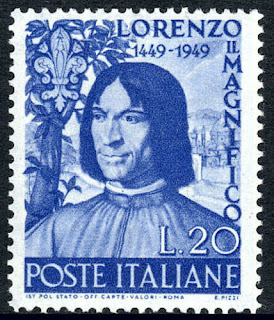
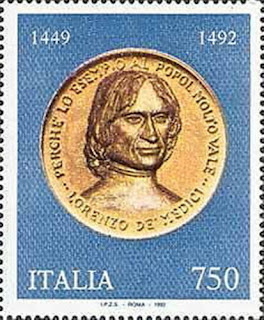



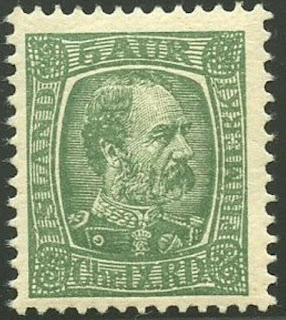


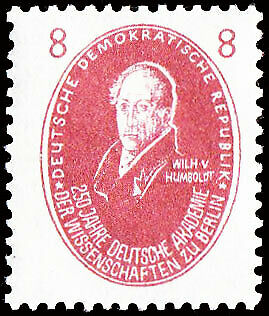

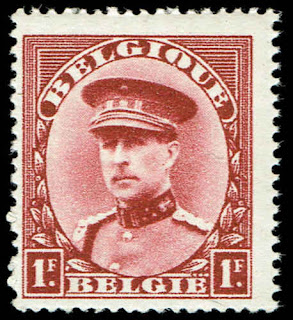

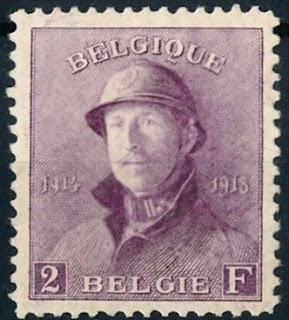
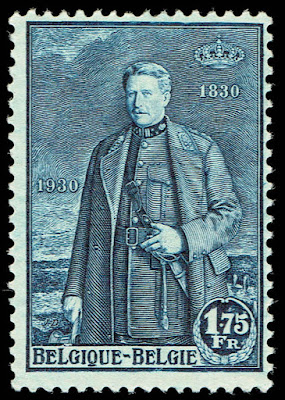


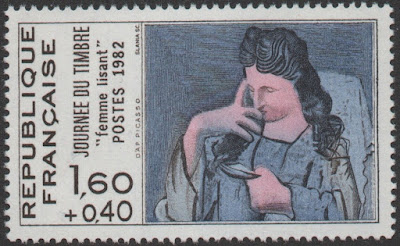
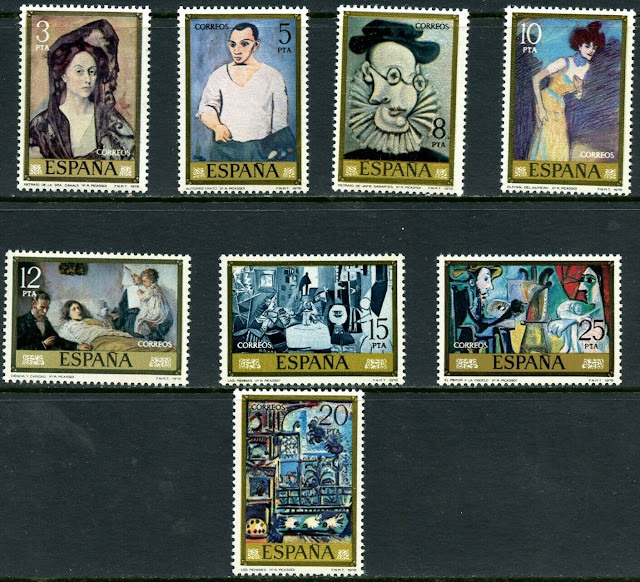
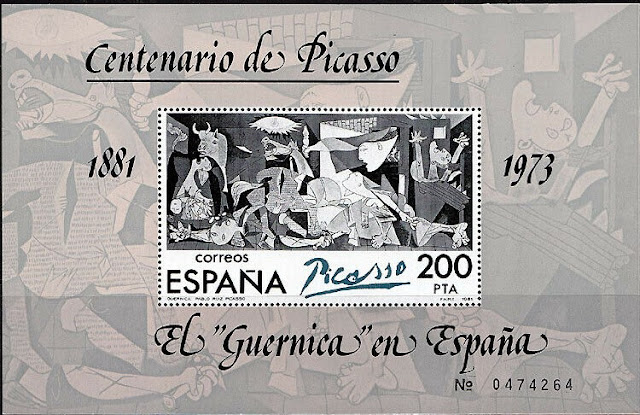
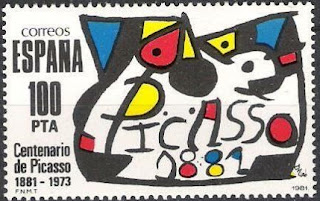
No comments:
Post a Comment